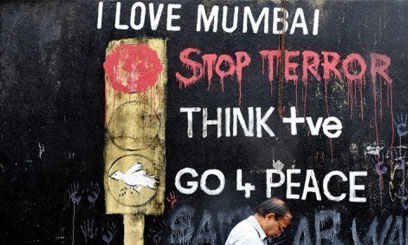
India said it received no prior warning or claim of responsibility for the attack © AFP Indranil Mukherjee
MUMBAI, Jul 14 – Indian investigators turned to CCTV footage on Thursday in their struggle to identify who was behind a series of bomb blasts in Mumbai that killed 17 people and injured more than 130.
Home Minister P. Chidambaram said there had been no intelligence of an impending attack and, in the absence of any group claiming responsibility, the net of suspicion was flung far and wide.
“All groups hostile to India are on the radar. We are not ruling out anything, we are not ruling in anything. We are looking at everyone,” he told reporters after visiting the scene of the three blasts.
The bombs made of ammonium nitrate — an ingredient for fertiliser commonly used in improvised devices — went off in the space of 15 minutes on Wednesday evening, in two crowded commercial areas of south Mumbai and a central residential district.
“I think they chose the places because of the density of the population and the very congested nature of these areas,” Chidambaram said. “They chose places where even a low-intensity blast could have a great impact.”
The official death toll stood at 17. A total of 131 injured were admitted to hospital, of whom 23 were in a serious condition.
Specialist forensic teams, flown in from other cities, combed the blast sites for evidence, but Rakesh Maria, head of the Maharashtra state anti-terrorism squad said monsoon rains were hampering their work.
Maria, who declined to speculate on who might be responsible for the blasts, said investigators hoped CCTV images obtained from all three locations would provide them with a lead.
Crime branch officers have been looking at the footage since last night.
“It’s quite a long-drawn process,” Maria said, while appealing for public “faith and trust” in the police.
“No matter where the accused are, we will identify and bring them to book,” he said.
The Home Ministry said police were interrogating suspected members of the
homegrown militant group Indian Mujahideen, who had been arrested in Mumbai several days ago in connection with bomb blasts in the western state of Gujarat in 2008.
The strongest of Wednesday’s coordinated explosions hit busy jewellery trading districts in the south of the city, the same area targeted two and half years ago in the traumatic 2008 assault blamed on the Pakistan-based Lashkar-e-Taiba militant group.
The memory of that attack — 60 hours of mayhem as 10 gunmen rampaged through the main railway station and luxury hotels, killing 166 — is still fresh in the minds of Mumbaikars.
Salim Dharolia, a small-time diamond trader who was waiting to collect the body of his son at the Saifee hospital, wondered aloud why more blood had been shed in his city.
“I have lost my only son. He got married two months ago. Why are people of Mumbai being targeted all the time? What is our crime?” he told AFP.
Relatives of the hurt and deceased gathered at the 13 city hospitals where victims were transferred in ambulances, cars and trucks driven by locals who rushed to help.
Among the dead was real estate agent R.K. Shah, 47, whose distraught wife had identified his body at Saifee hospital.
“He was scheduled to show two shops for rent to his clients,” Pratika Shah told AFP. “Before leaving home, he had told me that he would host a big party for his friends if the deals materialised.
“I still can’t believe that he is dead,” she said.
Prime Minister Manmohan Singh was due to arrive in Mumbai on Thursday evening to visit some of the injured in hospital.
The blasts came before a visit to India by US Secretary of State Hillary Clinton next Tuesday and ahead of peace talks between the Indian and Pakistani foreign ministers that are scheduled for New Delhi in the last week of July.
India’s foreign ministry spokesman said the talks would go ahead.
The United States and the United Nations led international condemnation of the attacks, with Clinton calling them “despicable” and vowing to go ahead with her trip.
While the perpetrators were not known, initial suspicions fell on two Islamist groups that have targeted India in the past: the home-grown Indian Mujahideen and the Pakistan-based Lashkar-e-Taiba (LeT).
The last major bombing in India was in February last year in Pune, when a blast at a packed restaurant killed 16 people including several foreigners.
In 2006, a series of high-powered blasts on suburban trains in Mumbai killed 187 commuters and left 800 injured — an attack that India also blamed on Pakistan-based militants.
India broke off a peace dialogue with Pakistan after the 2008 assaults and talks between the two nuclear-armed rivals only resumed earlier this year.









































